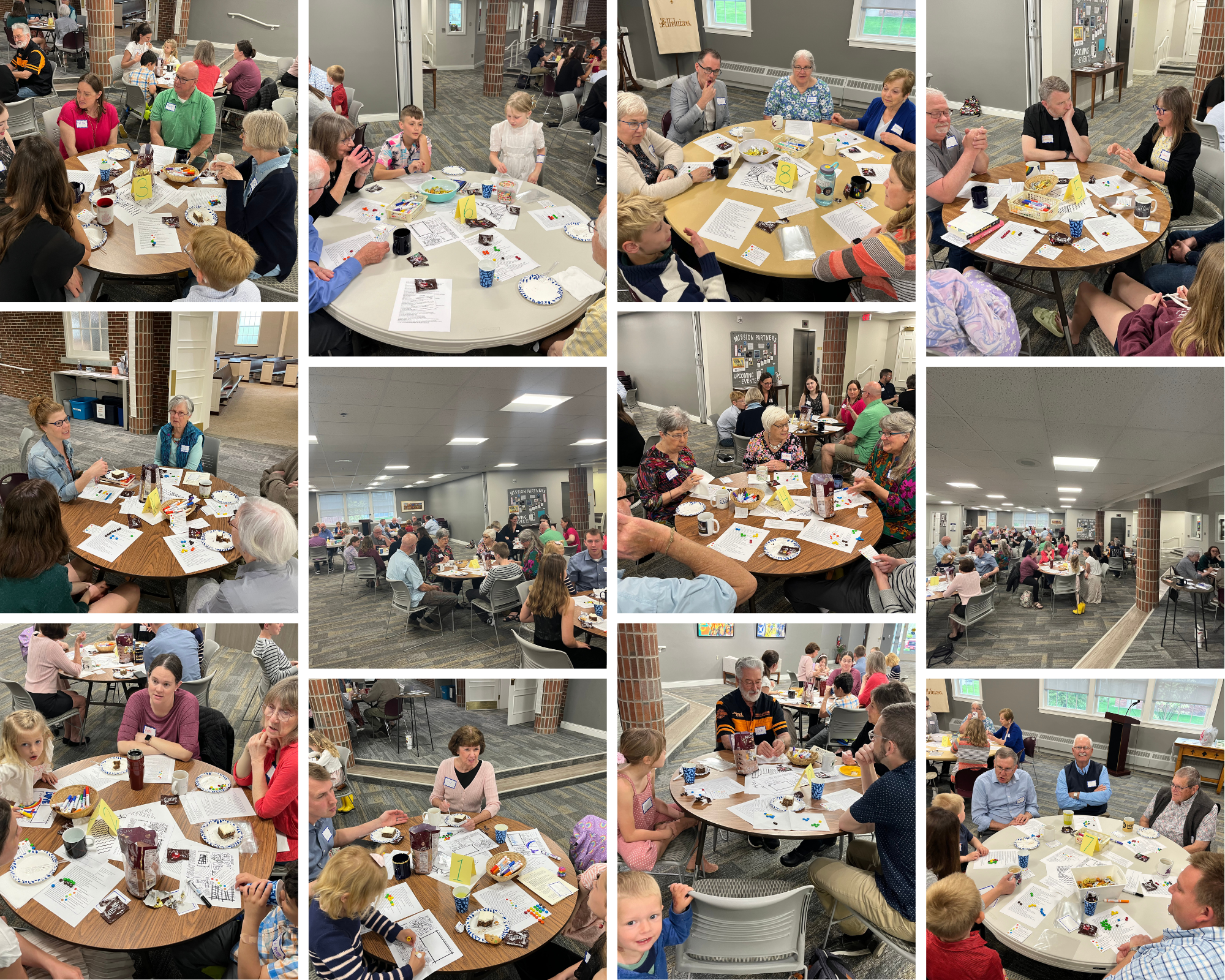
Statement of Inclusion
Since 1904, Second Reformed Church has sought to be a place of welcome and inclusion. This has looked different over the decades and will likely look different in future decades. Given our history and our current sense of God’s direction, Second strives to be a place that welcomes into the full life of the church all who seek to know, love, and follow Jesus regardless of race, ethnicity, physical or mental ability, marital status, sexual orientation, gender, age, economic condition, or life experience. We recognize that we will do this imperfectly and we may not all agree. Even so, we move forward with humility, patience, and trust in the grace and faithfulness of God. We commit to accept, respect, and love one another along our faith journeys. As God loves us, so let us love one another.
Adopted by Consistory, May 2025
What does this statement mean for Second church?
-
We believe that faithful study of scripture can yield a diversity of perspectives on life’s difficult questions, such as how those scriptures apply to modern life, human sexuality, and paths to relationship with God.
Throughout the entirety of scripture, the Spirit of God leads God’s people to break down barriers. God’s power freed the people from Egypt (Exodus, Deuteronomy). Through the power of God, the early church bridged the mighty chasm between Jew and Gentile (Acts 11, Galatians 3). Most notably, Christ himself, through his death, knocked down the dividing wall of hostility (Ephesians 2) that separated us from God and from each other. The way any of us are a part of God’s body is by believing in Christ and believing that God raised him from the dead (Romans 10:9). We believe that the Spirit’s work continues to call us to confront the barriers that prevent people from hearing and experiencing the fullness of God’s grace and love. We want the grace of Jesus to be demonstrated in our life together (ie., bearing the fruit of the Spirit as named in Galatians 5), as well as the belief that every single person bears the image of God and has gifts to offer the community; every single person can receive the grace of Jesus Christ and the church is compelled to enact that grace in its policies and vision. The early church followed the Spirit’s lead in recognizing the gifts of eunuchs, women, the poor, and others who were often excluded from fellowship or leadership.
God’s intention is to bring diverse people into community with one another, that they might worship God and follow Jesus Christ together. Therefore, the early church strove to fellowship with each other despite vast differences. They united in Christ around the Lord’s table, which bound them in communion with God and each other. We desire to live within that tradition.
We recognize that not all Christians agree on the many questions surrounding sexuality, and we do not expect that everyone in our church will hold the exact same views. We know that there are seven passages of scripture that reference homosexual behavior. We know there are passages in the New Testament that reference divorce and women in leadership in the church. There are many places in scripture that have historically led to disagreement in the church. This statement invites a broader reading of scripture, acknowledging the breadth of what scripture has to say to us. Through the power of God’s Spirit, we seek to respect one another and strive for unity around the communion table, for the sake of God’s mission in the world.
-
The list is meant to be illustrative, not exhaustive. We believe that a diverse membership is a strength of the church and that by welcoming a diversity of people with a diversity of gifts into the full life of the church, we become a stronger, more faithful congregation of Jesus Christ. However, because some Christians have been excluded from full participation in the life of the church due to these categories, sexual orientation in particular, it is important to clearly communicate our welcome.
When the Apostle Paul wanted to affirm that “all are one in Christ” (Galatians 3:28) he prefaced it by saying, “There is no longer Jew or Greek, there is no longer slave or free, there is no longer male and female.” These were some of the social barriers in Paul's time. The prophet Isaiah specifically mentioned the foreigner and the eunuch as belonging among God's people because these were categories of people who had formerly been excluded (Isaiah 56, Deuteronomy 23). Jesus began his public ministry by quoting from Isaiah 61 and naming the poor, the captives, the blind, and the oppressed (Luke 4:18-19). When certain people have been previously singled out, excluded and/or discriminated against, it is important to mention them by name in order to be clear that we mean to include them.
-
Consistory will continue to exercise the same responsibility and authority as it has in the past. In the RCA, Elders admit persons into membership, act on requests for baptism and marriage, and exercise responsible care and oversight of all the members including the pastors. The same vows and expectations apply to all people requesting membership in the church. Elders, acting in their discernment on behalf of Second Church, shall not disqualify an individual solely on the basis of one of these aforementioned characteristics.
-
We mean that participation in worship, communion, baptism, teaching or leading in church activities or programs, serving on a church committee, ordination as elder, deacon, or minister of Word and sacrament, funerals, weddings, or pastoral care, will not be denied because of race, class, sexual orientation or any other such category.
-
We continue to maintain historic standards of Christian belief and character.
For membership, a person must demonstrate a desire to join this community as a Christ-follower.
We maintain that marriage is always between two consenting adults, and we uphold the importance of fidelity and monogamy in marriage.
Not all people are gifted for leadership. While this statement makes leadership possible, in no way does it guarantee that every person is gifted to serve as a leader.
As stated in the BCO, we expect elders and deacons to be members of spiritual discernment, exemplary life, and charitable/compassionate spirit.
Our policies will always prioritize the safety of our children and youth. This statement does nothing to alter our current background checks, Child Protection Policy, or other volunteer screenings.
We do not expect that every member, elder or deacon, staff, or minister of Word and sacrament will be in full agreement with this statement or its implementation. Their dissent shall not disqualify them from full participation in the life of the church.
This statement does not diminish the importance of standards and Christian character for all members and leaders. It does give clarity to leadership that certain persons may now be considered for full participation in the life of the church, within the context of those other standards of faith and life.
-
We recognize that this is a journey that requires continual re-assessment of our ministry and fellowship, rooted in God’s love and grace. We continue to critically analyze our practices to ensure people from all walks of life feel welcomed into full participation in the life of the church, and we value your perspectives and feedback about how to do this. We will continue to deeply value worship and music, food ministries, and intergenerational ministry. We will maintain our commitments to our community and our various mission partners. Rather than letting our differences divide us, we celebrate our diversity and courageously trust the Holy Spirit to lead us into unity that goes beyond uniformity.
Additional Children’s and Youth Ministry Considerations
-
On Sunday mornings we use the Children In Worship curriculum. None of these materials addresses issues connected to sexuality. If issues relating to human sexuality arise in Children’s Ministry, children will be referred to their parents or guardians.
-
This Statement says that all members can be involved in the full life of the church. “Full life” includes volunteering in our Children’s Ministries. Volunteers go through the process of an application, references, and a background check. Volunteers are also trained on Second’s Child Protection Policy and complete basic training with Ministry Safe.
-
We will use discretion when engaging with children and youth around sensitive topics. Leaders and volunteers will defer to parents or guardians. As a congregation, Second has committed to respect theological diversity.
-
Staff and volunteers will follow parent’s or guardian’s lead in responding to their children.
-
Families look different and we will leave it at that.
Considerations Regarding Youth Ministry
-
We welcome all youth, and we treat all youth with the dignity given to them by God. It is important that students know that we will come alongside them for anything they are going through. If the parent or guardian of the youth is unaware, then we will assist the youth in talking with their parents/guardian, just as we would with any other important situation.
-
MS currently uses a curriculum from Illustrated Ministry covering Revised Common Lectionary assigned scriptures. HS uses videos and study guides from the Bible Project. Youth Group currently has a strong focus on play, fellowship, and prayer. If controversial topics are going to be addressed, parents/guardians are notified in advance and give full say over their child’s participation.
